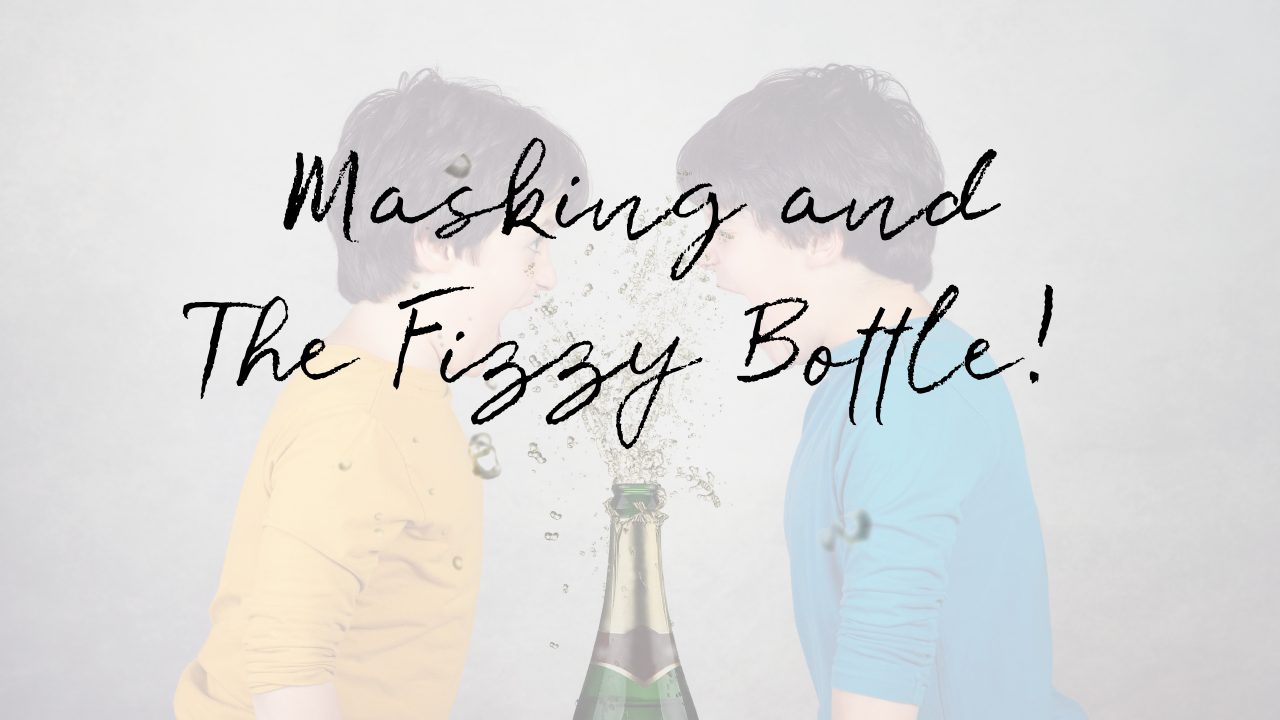
Masking and The Fizzy Bottle!
Sep 24, 2021Masking and The Fizzy Bottle!
School can often feel an unsafe place for a young person with PDA. And this is when you might see that behaviour which reminds you of Jekyll and Hyde!
I know from experiencing this with my own children, they seem to have less emotional control when they don’t feel safe enough to show their struggles in school and start masking their behaviour. This is such a lot of hard work and an incredible amount of emotional strain and tends to happen more often when there’s a lack of flexibility and understanding towards their needs, especially when conventional approaches to delivering education are used without the option of tailoring it to the perspective and understanding of the student .
Young people and children with PDA don’t necessarily see someone in authority as being someone they have to look up to; hierarchy is not always something that makes sense. They are more likely to see a teacher, or equivalent, as an equal. Which not only comes across at times as being disrespectful, albeit unintentional, but can end up as confrontational if the student is feeling they are not being heard or understood. In their mind, the only option is to mask how they are feeling to the outside world so they can feel in control of their inside world.
What does this actually mean?
When a young person masks, this is when they ‘appear fine’ in one setting, and completely different in another. A typical scenario is masking at school to avoid losing control and then having explosive and emotional outbursts once they feel they are in a ‘safe’ environment, which is most often at home. Which is a great deal of stress for the young person, and the family.
It can be difficult to remember that explosive behaviours are the outpouring of the anxiety that’s been bottled up all day. Masking is exactly what it sounds like, ‘wearing a metaphorical mask’ as they want to fit in and not be seen as different.
Masking has many different guises, and the ways a young person might behave, from copying how other class members are behaving to mimicking how others act, are typical behaviours and tell-tale signs that CAN be spotted by a specialist eye, or a member of staff who is tuned into the student’s needs.
However, if a young person masks for a long period of time it can have a huge detrimental effect to their overall wellbeing and some very serious problems for their emotional development. Autistic burn out, trauma induced symptoms including PTSD, and permanent high levels of anxiety. All of which create further physical symptoms as cortisol and adrenaline are on a constant drip throughout the body.
The impact on those around a young person who masks all day at school for several hours at a time is usually seen in one of two ways. They are seen as ‘fine’ by school staff, and ‘emotionally explosive’ by family/carers at home. Which is why masking is often referred to the ‘fizzy bottle’ effect.
How can we help the young person ?
Firstly, it is important to ensure that anyone who is in that young person’s world recognises their need for control is often driven by anxiety; the anxiety of not being understood. And this can be in advance of a situation they think is going to occur, not just at the time of something happening.
Here are some key tips:
- Give them time to process information and make sense of it. They might need to ask questions to feel safe. Let them.
- Give them plenty of time to plan ahead and process what’s been asked of them.
- Be aware that all their senses-will be impacted by a busy classroom.
- Having a flexible approach in expectations around the work they need to undertake and the behaviours that might arise from how they feel about those tasks.
- Pick your battles; you really won’t know how difficult it is for them and it is not about winning to prove a point.
- Look at a collaborative approach if you know there is a potential challenge coming up and use their interests to engage with them.
The biggest area is building TRUST before anything else.
Ultimately it boils down to giving them more time to work through each step in their own mind, giving THEM some BREATHING space. This reduces the potential for an explosion or an outburst which gives you some breathing space too. More breathing space equals more opportunity for calm. More calm equals less fizz...
If you are able to unpick what is actually going on for them, and understand how they might be feeling, it helps them feel heard, understood and in a better position to self-regulate rather than mask.
When all else has failed, comedy is my go to, you should see my dancing skills in the kitchen!
But don't worry! If dancing is not your 'thing', pop over to see our 3 Webinars designed to help you understand what your child or young person is trying to communicate with you.
CLICK HERE FOR THE SERIES OF 3 WEBINARS


